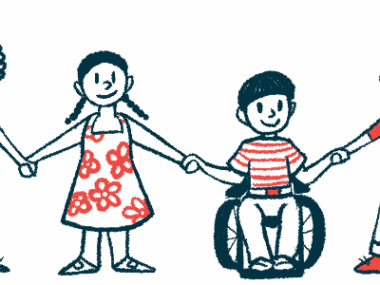Study highlights psychological, social challenges of having DMD
The worsening of disease over time is a source of frustration
Written by |

Duchenne muscular dystrophy (DMD) can make it harder to engage in social activities, and patients often experience grief and frustration over lost function. Family, however, can be an invaluable source of support to help overcome the challenges of the disease.
That’s according to a study, “‘You Take This Day by Day, Come What May’: A Qualitative Study of the Psychosocial Impacts of Living with Duchenne Muscular Dystrophy,” published in Advances in Therapy. The work was funded by Sarepta Therapeutics, which markets several approved treatments for DMD.
Living with a lifelong chronic health condition like DMD changes the way a person moves through the world and interacts with others. Scientists at Sarepta and other institutions conducted a series of interviews aiming to better understand the emotional and social impacts of DMD.
A total of 19 interviews were conducted: 12 with caregivers, four with patients and caregivers together, and three with just patients. In cases where only caregivers were interviewed, it was usually because the children were very young and couldn’t meaningfully participate in the conversations.
The study only included people with DMD who did not have co-occurring psychiatric diagnoses, such as autism spectrum disorder or obsessive-compulsive disorder, because the researchers wanted to zero in on the impact of DMD itself.
Physical limitations can be frustrating
The researchers highlighted three major themes from the interviews. First, DMD can limit the social activities that patients are able to take part in, especially when it comes to physically intensive activities like sports.
“He plays outside, he kicks the football, he, you know, rides his bike, he runs around, he swims and things like that,” one caregiver said of their child. “But I think everything is just kind of limited. He can’t do it as fast or as long.”
While barriers like this can make it harder to participate in some activities, patients themselves reported a range of attitudes about their limitations. While some were frustrated they couldn’t do more, others found they were content to focus on more accessible activities like reading or video games.
“While it is difficult to know to what extent their interests might differ without DMD, it was made apparent in most interviews that boys and young men living with DMD adapt to their experiences and find enjoyment in their chosen activities,” the researchers noted.
It was also common for patients to report feeling better equipped to engage in enjoyable activities when they could use adaptive devices like wheelchairs to increase their own independence — though, of course, that depended on venues being accessible to wheelchair users.
“In the beginning, when he was losing abilities and did not have the wheelchair, he kind of felt like he lost his freedom, but once the wheelchair came into play, he regained that and was able to do things again,” one caregiver remarked.
A second major theme the researchers found was that families’ experiences are shaped by the fact that DMD is a progressive disease that worsens over time, often leading to frustration and grief. Loss of arm function in later stages of disease was a particular source of frustration, more so than needing a wheelchair, since losing arm function makes it so much harder to do many day-to-day activities without help.
One caregiver said of their child’s lost hand function that it “is frustrating for him because I’ve got to position his hands on the laptop exactly where he wants them. And then, even then, he can’t reach some numbers.”
The third theme highlighted in the study was the importance of family as a source of emotional support. “We’re here to help you, catch you if you fall,” is how one caregiver expressed that idea.
“Overall, participants described persevering as a family through each new challenge they faced and emphasized how greatly they valued the support system they had developed,” the researchers wrote.
The scientists said that although their study was limited to a handful of interviews, the results can provide insight into the multifaceted impact that DMD has for people living with it. The results also may be useful “to ensure that the lived experiences and perspectives of patients and caregivers are accounted for when considering the potential benefits of emerging treatments,” they wrote.





